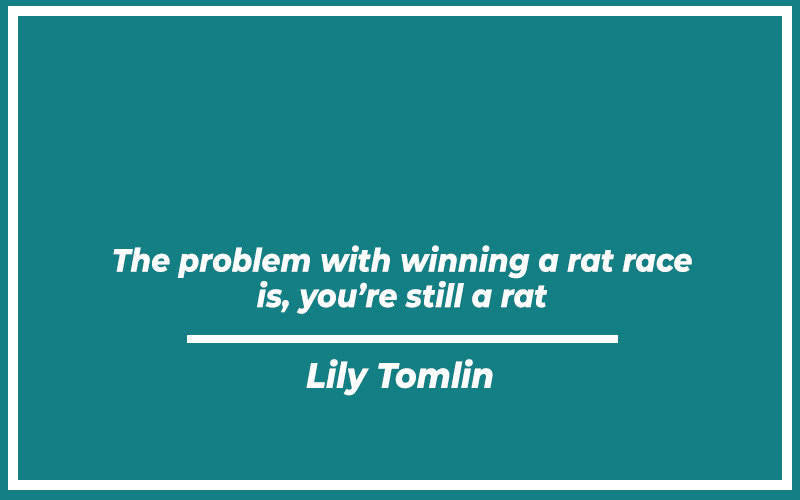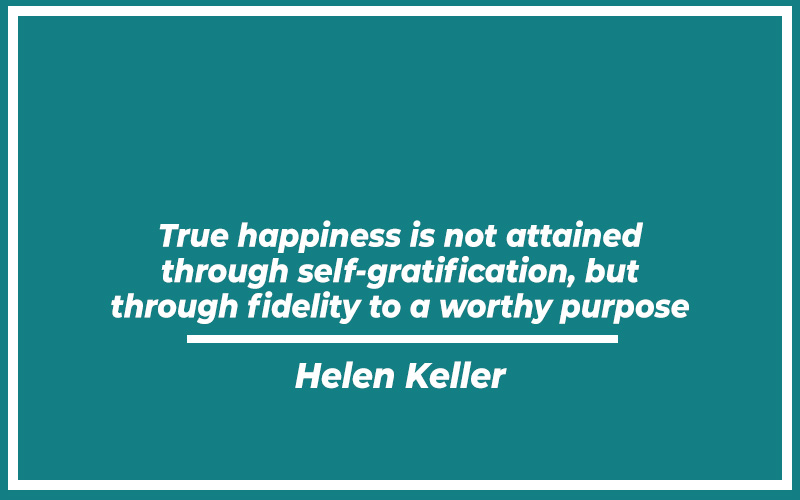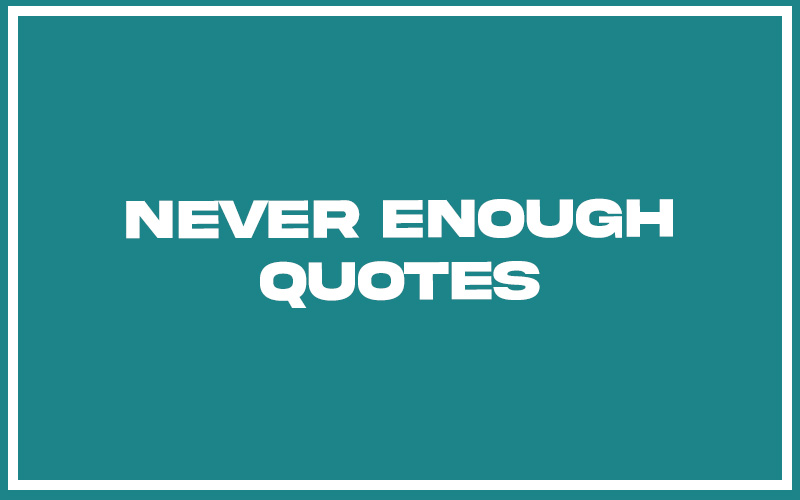If you’ve ever felt that relentless drive for more—whether it’s success, approval, or love—then “never enough” quotes will strike a familiar chord. These quotes delve into the human condition of perpetual desire, highlighting our deep-seated yearnings and the dissatisfaction that often accompanies them.
As you explore these quotes, they can offer insights into why we sometimes feel like no amount of achievement or possession fully satisfies us.
They challenge you to reflect on what truly fulfills you and to reconsider where genuine contentment is found.
Best Never Enough Quotes

“The problem with winning a rat race is, you’re still a rat.” – Lily Tomlin
Lily Tomlin’s wry observation critiques the relentless pursuit of success in competitive environments, often referred to as the “rat race.” This quote challenges the value of achieving success at any cost, suggesting that even if one wins, they have not fundamentally changed their circumstances or selves.
It’s a humorous yet poignant reminder to reassess what true success means and whether it’s worth the personal sacrifices often demanded by such competitions.
Also Read: Gus Fring Quotes (with Explanation)
“Just because it’s never enough doesn’t mean it’s not worth doing.” – Gretchen Rubin
Gretchen Rubin addresses the feeling that no amount of effort seems sufficient, yet she encourages perseverance despite this sense of insufficiency. This quote reassures us that actions worth doing are valuable for their own sake, not just for their outcomes.
It advocates for finding satisfaction in the process and the progress, rather than being solely fixated on the end results, highlighting the intrinsic value of persistence.
“Beware of destination addiction: The belief that happiness is in the next place, the next job, or with the next partner.” – Robert Holden
Robert Holden’s warning about “destination addiction” cautions against the perpetual search for happiness in future achievements or acquisitions. This quote encourages appreciation of the present and finding contentment in the current moment.
It’s a call to break the cycle of believing that happiness is always just out of reach, promoting a more fulfilling and grounded approach to life.
“No matter how much you achieve, someone else always has more.” – Oprah Winfrey
Oprah Winfrey reflects on the endless comparison trap that can rob us of satisfaction and joy. This quote points out the futility of measuring personal success against others, as there will always be someone with more achievements or possessions.
It encourages focusing on personal goals and values instead of external metrics, fostering a sense of fulfillment that is not dependent on comparisons.
“Your best will never be good enough for the wrong person.” – Unknown
This quote emphasizes the importance of surrounding oneself with people who appreciate and value you for who you are. It addresses the struggle of trying to meet impossible standards, highlighting that for some people, no amount of effort will suffice.
This serves as a reminder to invest energy and affection in relationships that are reciprocal and affirming, rather than those that are perpetually dissatisfying.
“If your happiness depends on what somebody else does, I guess you do have a problem.” – Richard Bach
Richard Bach’s quote challenges the reliance on external validation or circumstances for personal happiness. It encourages self-sufficiency in emotional well-being and highlights the problem with outsourcing this responsibility.
This perspective advocates for developing inner sources of happiness and fulfillment, making one’s emotional state less vulnerable to the actions and choices of others.
“If ‘enough’ is never enough, you’re never going to be happy.” – Denise Duffield-Thomas
Denise Duffield-Thomas succinctly captures the dilemma of insatiable desire, pointing out the direct impact on personal happiness. This quote serves as a caution against the endless pursuit of more—whether it’s money, status, or possessions—as a path to happiness.
It suggests that learning to appreciate what one already has is crucial for achieving lasting contentment, encouraging a shift from constant wanting to gratitude.
“Enough’ is a feast.” – Buddhist Proverb
This Buddhist proverb encapsulates the concept of contentment and gratitude. It suggests that recognizing and appreciating what we already have can turn even the simplest of provisions into a feast.
This perspective encourages a shift from a mindset of scarcity to one of abundance, highlighting the power of perception in defining our sense of satisfaction and fulfillment. By embracing ‘enough’ as ample, we foster a spirit of gratitude and contentment that enriches our lives far more than constantly striving for more.
“Perfection is not attainable, but if we chase perfection, we can catch excellence.” – Vince Lombardi
Vince Lombardi’s quote reflects the motivational ethos of striving for high standards. While he acknowledges that perfection is an impossible goal, he champions the pursuit of it as a means to achieve excellence.
This outlook encourages continual improvement and setting high goals, while also implying the importance of recognizing and accepting the limits of what can be achieved. It’s a call to strive for the best possible outcomes, not by being perfect, but by constantly improving.
“Being content with what you have is the first step to happiness.” – Dalai Lama
The Dalai Lama teaches that happiness begins with contentment. This quote emphasizes the importance of acceptance and satisfaction with one’s current circumstances as foundational to experiencing happiness.
It challenges the pervasive societal notion that happiness comes from acquiring more, urging instead for a deeper appreciation of the present. This approach fosters a peaceful and fulfilling life, free from the relentless pursuit of external desires.
“When you realize there is nothing lacking, the whole world belongs to you.” – Lao Tzu
Lao Tzu’s profound insight into fulfillment challenges us to view our lives from a perspective of completeness rather than deficiency. This quote suggests that the feeling of completeness allows us to experience life’s richness fully and without restraint.
By recognizing that nothing is lacking, we open ourselves to the abundance of the world, which shifts our focus from possession and acquisition to appreciation and participation.
“If you always want more to be happy, happiness will never come. Happiness doesn’t come from having more but from being satisfied with what you have.” – Unknown
This quote addresses the common misconception that happiness is achieved through accumulation. It points out the endless cycle of desire that can trap individuals into perpetual dissatisfaction.
By suggesting that true happiness comes from contentment with one’s current state, this message encourages a reassessment of personal values and goals, emphasizing the virtue of satisfaction over constant desire.
“Gratitude turns what we have into enough.” – Aesop
Aesop’s timeless wisdom connects gratitude with a sense of sufficiency. This quote suggests that practicing gratitude can transform our perception of our possessions and circumstances, making them feel adequate and fulfilling.
It’s a reminder that often, our pursuit of happiness is not about getting more but about appreciating more deeply what we already possess, thereby converting perceived scarcity into recognized abundance.
“It’s not about having what you want, but wanting what you have.” – Sheryl Crow
Sheryl Crow’s lyric from her song captures the essence of contentment. This quote highlights the difference between endless longing and appreciating the present. By shifting focus from the pursuit of possessions or achievements to enjoying and valuing what is currently in our lives, we can find deeper satisfaction and happiness.
This approach not only enhances personal well-being but also reduces the stress and discontent that often accompany the pursuit of more.
“The grass is greener where you water it.” – Neil Barringham
Neil Barringham’s quote is a metaphorical reminder that personal investment and attention yield growth and satisfaction, rather than constantly seeking something better elsewhere. This perspective encourages nurturing the relationships, possessions, and opportunities we already have, instead of envying others.
By focusing our efforts on improving and appreciating our current situation, we create our own abundance and fulfillment, effectively making our “grass” greener. This approach promotes a proactive and appreciative attitude toward life, which is essential for finding contentment and happiness.
“You can’t have everything. Where would you put it?” – Steven Wright
Steven Wright’s humorous take on the pursuit of material accumulation challenges the practicality and necessity of owning everything we desire. This quote playfully points out the absurdity of excessive consumerism by questioning the physical space it would require.
It serves as a light-hearted reminder to prioritize and appreciate what we have, emphasizing that the endless accumulation of goods does not equate to increased happiness and often complicates life unnecessarily.
“Happiness is not having what you want, but wanting what you have.” – Rabbi Hyman Schachtel
Rabbi Hyman Schachtel’s quote explores the concept of happiness from a standpoint of contentment and gratitude. By shifting the focus from a constant desire for more to an appreciation for the present, he suggests that true happiness arises from a state of satisfaction with what is currently in one’s life.
This change in perspective helps cultivate a sense of fulfillment and peace, reducing the perpetual longing that often distracts from enjoying the here and now.
“Do not spoil what you have by desiring what you have not; remember that what you now have was once among the things you only hoped for.” – Epicurus
Epicurus’ wisdom cautions against taking current blessings for granted while yearning for more. This quote encourages an attitude of gratitude for present possessions and circumstances, reminding us that many things we now possess were once only wishes.
By appreciating what we have, we can maintain a sense of contentment and joy, avoiding the dissatisfaction that comes from focusing solely on future desires.
“If you look at what you have in life, you’ll always have more. If you look at what you don’t have in life, you’ll never have enough.” – Oprah Winfrey
Oprah Winfrey’s insight on perspective highlights the impact of our focus on our perception of abundance or scarcity. By appreciating our current possessions and achievements, we can feel a sense of wealth and satisfaction. Conversely, focusing on deficits can lead to perpetual dissatisfaction.
This quote promotes the practice of gratitude as a way to enhance well-being and happiness, encouraging a positive outlook that recognizes and values life’s existing gifts.
“Success is getting what you want. Happiness is wanting what you get.” – Dale Carnegie
Dale Carnegie differentiates between success and happiness, suggesting that true happiness comes not from mere achievement but from appreciating and desiring the outcomes of those achievements. This quote implies that while success can be measured externally by accomplishments, happiness is an internal state influenced by our satisfaction with what those accomplishments bring us.
It encourages a reevaluation of our goals to ensure they align with what will truly make us happy, rather than pursuing objectives for their own sake.
“Satisfaction lies in the effort, not in the attainment. Full effort is full victory.” – Mahatma Gandhi
Mahatma Gandhi’s quote emphasizes the value of effort over the outcome. This perspective suggests that true satisfaction comes from the process of striving towards a goal, rather than the end result itself.
By valuing the effort, we can find fulfillment in our actions regardless of the outcome, promoting a focus on personal growth and persistence. This approach fosters resilience and a sense of accomplishment that is independent of external validations or results, highlighting the intrinsic rewards of dedication and hard work.
“Contentment comes not so much from great wealth as from few wants.” – Epictetus
Epictetus, a philosopher of Stoicism, teaches that true contentment is achieved not through accumulating wealth, but by moderating desires. This quote encourages simplicity and a focus on essential needs over endless wants, suggesting that peace of mind comes from appreciating what we already possess.
By limiting our desires, we can reduce the constant pursuit of more, leading to a more satisfied and tranquil life. This perspective advocates for a reassessment of what is truly necessary for happiness, promoting a lifestyle that values satisfaction with the present over the acquisition of new possessions.
“The art of being happy lies in the power of extracting happiness from common things.” – Henry Ward Beecher
Henry Ward Beecher’s quote highlights the importance of finding joy in everyday experiences and simple pleasures. By focusing on the happiness that can be derived from ordinary moments, we cultivate a sense of appreciation that enhances our overall well-being.
This approach encourages us to be present and mindful, recognizing the beauty and satisfaction in what might otherwise be overlooked. It teaches that happiness does not require extraordinary circumstances, but can be consistently accessed through gratitude for the common aspects of life.
“Enough is a feast.” – Buddhist Saying
This Buddhist saying succinctly captures the concept of sufficiency and gratitude. It implies that recognizing when we have enough transforms it into a feast, a celebration of abundance.
This perspective encourages us to shift our focus from what we lack to what we possess, fostering a sense of abundance from within. It invites us to find satisfaction in moderation and to celebrate the resources we already have, promoting a life of simplicity and contentment.
“Success is not the key to happiness. Happiness is the key to success. If you love what you are doing, you will be successful.” – Albert Schweitzer
Albert Schweitzer’s quote links happiness with success, positing that joy in one’s endeavors leads to true achievement. This perspective suggests that success follows naturally when one is engaged in work they love, as passion fuels persistence and excellence.
It encourages us to pursue activities that fulfill us personally, rather than those we think will lead to conventional success. This approach ensures that our efforts are rewarding in themselves, making the journey as fulfilling as the destination.
“When you realize nothing is lacking, the whole world belongs to you.” – Lao Tzu
Lao Tzu’s ancient wisdom teaches that a sense of completeness changes our interaction with the world. This quote suggests that recognizing the sufficiency of what we have frees us from the desire for more, opening up a world of possibilities.
It promotes a mindset of abundance and empowerment, encouraging us to live fully and freely with a sense of security and belonging that comes from within.
“Be thankful for what you have; you’ll end up having more. If you concentrate on what you don’t have, you will never, ever have enough.” – Oprah Winfrey
Oprah Winfrey’s advice highlights the role of gratitude in creating abundance. By focusing on our blessings, we attract more positivity and opportunities into our lives, whereas concentrating on deficits can perpetuate feelings of lack.
This quote encourages a positive outlook that appreciates current possessions and achievements, fostering a cycle of gratitude that enhances our life experience.

“True happiness is not attained through self-gratification, but through fidelity to a worthy purpose.” – Helen Keller
Helen Keller asserts that lasting happiness comes from commitment to meaningful goals rather than momentary pleasures. This quote promotes the idea that true fulfillment is found in the pursuit of purposes that extend beyond oneself, suggesting that contributing to something larger provides a deeper, more enduring sense of satisfaction.
It encourages us to find and commit to causes that resonate with our values, enhancing our sense of purpose and joy.
Also Read: Duke Ellington Quotes (with Explanation)
Final Thoughts
“Never enough” quotes shed light on the endless pursuit that can dominate our lives, prompting us to question the true value of always wanting more.
As you ponder these reflections, let them encourage you to find balance and to appreciate the abundance that already exists in your life.
Remember, while ambition can be a powerful motivator, it’s also important to recognize when to pause and be grateful for the present. Let these quotes inspire you to seek fulfillment not just in external achievements but in the richness of your everyday experiences.

